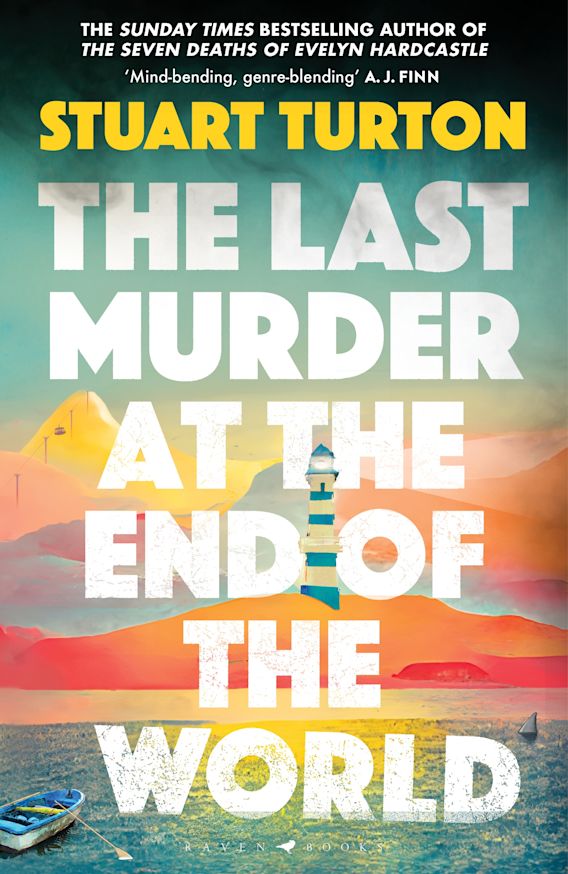THE LAST MURDER AT THE END OF THE WORLD
Stuart Turton (stuturton.com)
Raven Books (bloomsbury.com)
£20.00
Almost a century ago, the world was overrun by a myterious insect-filled fog that killed everyone it touched. The last survivors – 122 villagers and 3 scientists who are treated like gods – can be found on a small Greek island, protected from the fog by an invisible barrier. Life on the island is idyllic – the villagers each find their own niche, a task that will benefit the village, while the scientists ensure their continued survival, giving orders where necessary, guiding their charges and ensuring they obey the nightly curfew. Thea and Hephaestus are aloof, keeping their distance from the small community as much as possible, while Niema, the oldest of the scientists, takes part in the daily life of the village, joining in the nightly celebrations, and generally being the most accessible of the three “elders”. When one of the scientists turns up dead, violently murdered by person or persons unknown, the villagers learn that the invisible barrier has been lowered, and that they have 92 hours to solve the mystery to ensure the future of mankind. But how do you investigate a murder when the whole concept of murder is alien to your way of life?
It’s almost six years since Stuart Turton’s incredible debut, The Seven Deaths of Evelyn Hardcastle. Given the complexity of each novel, as he tries to up the ante with each subsequent mystery, it’s no wonder that The Last Murder at the End of the World is only his third outing, despite the fact that it feels like the work of a much more accomplished writer. Anyone who has read Evelyn Hardcastle, or Turton’s second novel, The Devil and the Dark Water will have some idea of what to expect going into this latest mystery. For Turton virgins, I can only offer the simple warning: prepare to have your mind blown.
Turton introduces us to Emory, a villager who stands out from the crowd. An adult, Emory has spent many years trying her hand at various tasks, or trying to learn various skills. But nothing seems to stick, to hold her attention, and give her a feeling of completeness. She is popular with the other villagers, but shares a special relationship with Niema, who seems to have taken Emory under her wing as the novel opens. Niema has been around since before the world ended, putting her somewhere in her second century when we arrive on the village. The other scientists have been around just as long, leading us to the conclusion that they’ve been the recipient of some drug or technology that hasn’t been shared with the villagers, who all die on the morning of their sixtieth birthday. Niema and Emory share a love for old detective novels, of which Niema has a small collection that she shares secretly with the villager. So it seems like a natural next step that Emory will use what she has learned to try to solve the murder that rocks the island, and save the village before the fog engulfs it and finishes the job it started a century ago. Emory is helped in her endeavours by her daughter and father, despite the strained relationship she shares with both.
The Last Murder at the End of the World is high-concept post-apcalyptic science fiction meets fiendish whodunnit. As we move through Emory’s investigation, we begin to learn some of the history of the colony that has since become the village. Why were the scientists on this island? How did they end up with a relatively small group of people to continue the human race? We are guided in a first-person narrative by Abi, an AI construct that has access to the minds of everyone on the island, a voice that the villagers hear from the moment they gain consciousness and a presence that controls every aspect of their daily lives. Turton gives us infrequent reminders that Emory is racing against the clock; a lesser author might have put a countdown at the start of each chapter, but Turton relies on the tension within the story to keep the goal in sight, while reminding us only three or four times throughout the book of how much time we have left. Turton’s excellent writing, the relationships he builds between the characters, the factions that seem to form and re-form as tensions rise and time runs out, all conspire to nail us to our seats and glue us to the page: will Emory solve the puzzle in time and save herself and her friends from the ever-encroaching fog?
We find ourselves in the hands of the ultimate unreliable narrator: as omniscient as “she” is, Abi presumably knows what happened the night the scientist died, but her programming prevents her from telling Emory the answer. What else, we wonder, is Abi keeping from us that might affect what we understand of the story, of the island, of these people? Her nature as an ethereal consciousness allows her present multiple points of view and jump between different characters in different locations in a way that a real person who has to obey the laws of physics wouldn’t be able to do. As with his previous novels, Turton plays his cards very close to his chest, drip-feeding the information we need as we need it, always giving us just enough rope to hang ourselves, to make a deductive leap. In the spirit of the true whodunnit, he provides us with all the information we need to reach the same conclusion that Emory eventually will without spoon-feeding us the answer. The science fiction setting puts a slightly different slant on the proceedings than we’d expect from an Agatha Christie or Ruth Ware, but the author’s careful plotting ensures that not only does it not detract from the mystery, but adds an additional layer to hold our interest throughout the story. Regular visitors will be aware of my love for post-apocalyptic novels, so this one is an instant favourite for more than one reason.
I think I can safely say that nobody writes books quite like Stuart Turton. Like his earlier novels, The Last Murder at the End of the World is like a Chinese puzzle box: we carefully work our way through the intricately-wrought layers, admiring the beauty of the construction even as a battle the frustration that he wants us to feel, until we reach the treasure at its heart and understand, finally, how everything fits together so neatly. It’s a novel that defies genre boundaries and I hope potential readers won’t be put off by the post-apocalyptic setting, as this is an absolute gem that should be read by anyone who considers themselves a fan of crime fiction. Stuart Turton continues to surprise with each new novel, each puzzle at least as intricate as the one before, the solution always within reach, logical and, most importantly, fair and satisfying. If you’ve read Turton before you’ll know what to expect, and you’re probably already all over The Last Murder at the End of the World; if you haven’t, this is as good a place as any to start. But be warned: you’ll need all your wits about you when you land at world’s end.


One thought on “THE LAST MURDER AT THE END OF THE WORLD by Stuart Turton”